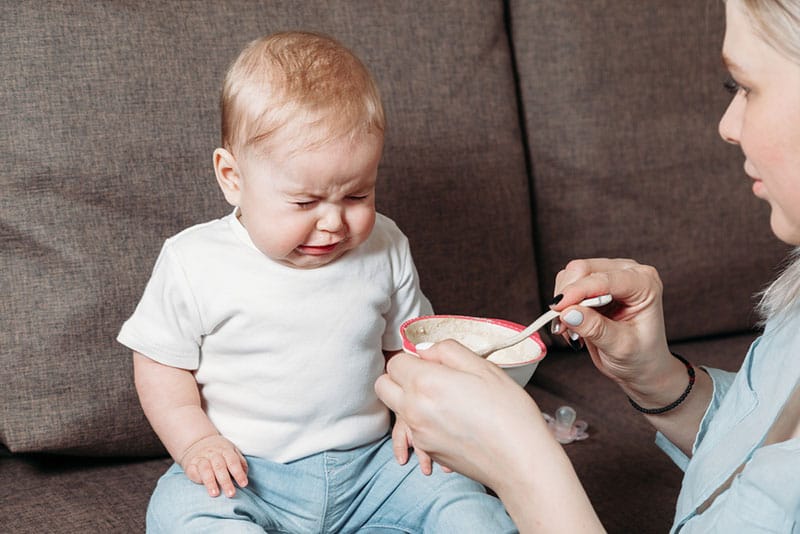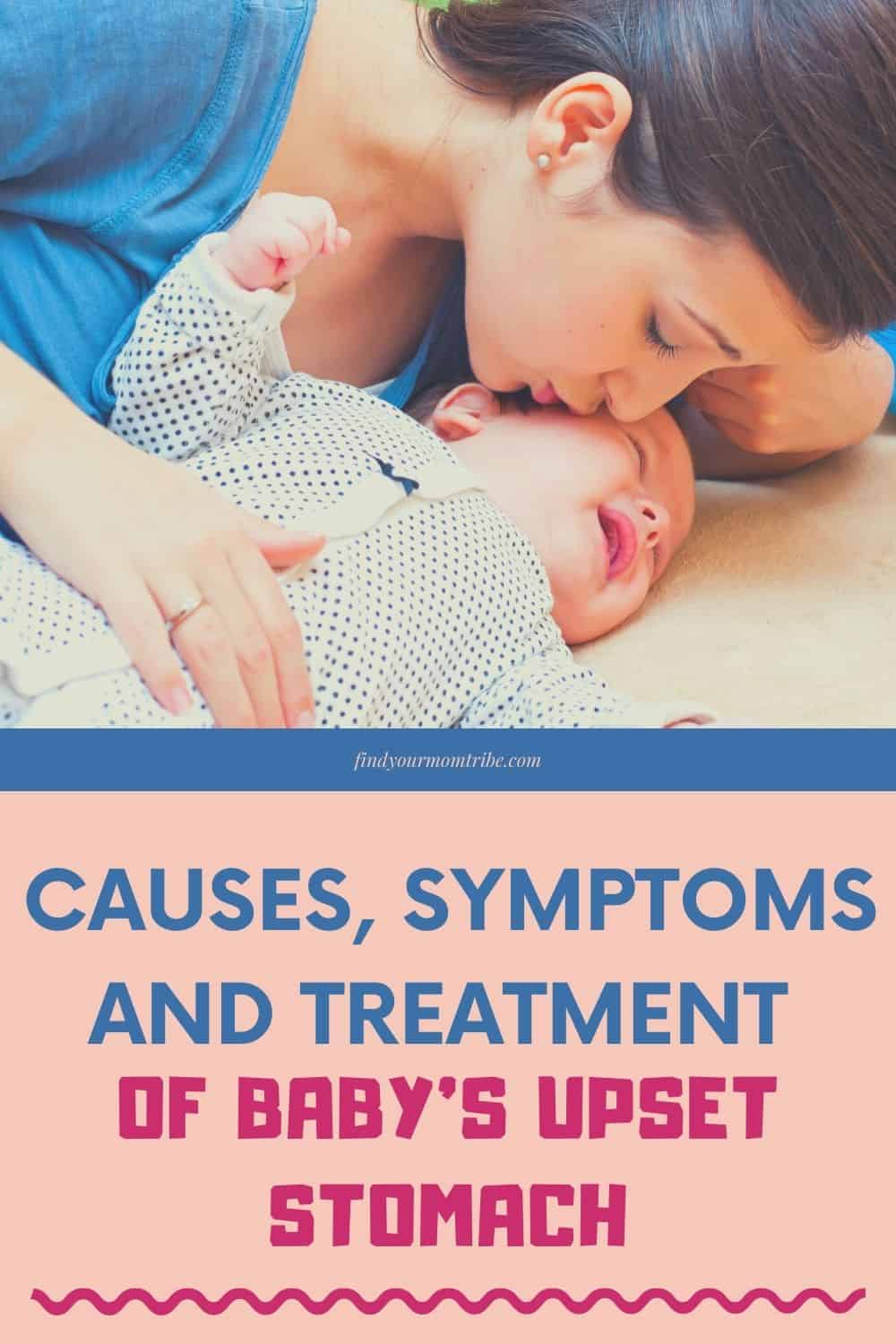A baby’s upset stomach is something every mother has experienced at least once.
Even though this is a common issue, where your infant is concerned, it’s normal to be out of your mind with every sign of trouble.
Naturally, you want to help your little ray of sunshine as soon as possible. To do that, you need all the possible intel about a baby upset stomach.
Well, that’s exactly what I’m going to share with you today – the causes, symptoms, and treatment of a baby’s upset stomach.
Causes Of A Baby’s Upset Stomach
There are a number of things that can cause this discomfort for your little one. Knowing the cause is the first step to figuring out how to solve the problem.
Stomach virus/infection

I know you’d be happiest if your baby’s immune system was always at its peak.
However, sadly, all babies catch a virus every now and then, and often, these viruses can cause stomach problems and infant gas.
In this case, the baby will have explosive and watery diarrhea and will vomit, besides experiencing stomach pain – a fever is nothing unusual either.
These symptoms normally last around one week.
Aside from viruses, your baby’s stomach problems can occur due to a variety of infections as well.
For example, some types of E.coli cause blood in the stool, among other symptoms.
Also, rotavirus might cause your baby stomach inflammation which is anything but comfortable.
However, if this is the case, they’ll probably start vomiting and develop a fever before experiencing stomach problems or cramps.
Gastroenteritis is another infection many babies get and it will cause vomiting and diarrhea.
Constipation

The next possible cause of your baby’s tummy problems could be constipation.
There is nothing to worry about if your baby poops regularly (and by that, I mean a few times a day) and if they do it without a struggle.
However, if you notice that your baby is having difficulty passing stools and they’re not as frequent as they should be, it’s possible that they’re suffering from constipation.
Swallowed air

A baby usually burps during feeding but sometimes, they swallow some air in the process.
Once that happens, the swallowed air enters the digestive system and ends up as gas. This gas is called flatus. This process typically causes problems for your newborn.
But, don’t worry! This is a very common occurrence for babies when they are feeding.
Excessive crying

Crying can be both the cause and the symptom of a baby’s upset stomach.
When a baby cries too much, they often swallow some air, which – as explained above – then causes stomach problems.
RELATED: Purple Crying: What Is It And How To Help Your Little One
Heartburn

Another cause of a baby’s tummy issues can be heartburn. This happens due to acid reflux.
Simply put, the stomach contents go back up into the esophagus causing pain in the chest, called heartburn.
Even though this is a condition which typically occurs in adults, infants can be affected as well. In fact, in most cases, an immature digestive tract causes this issue in babies.
When your baby is born, their digestive system still hasn’t developed enough to process certain foods which means your little one might have feeding intolerances that can cause vomiting and stomach ache.
Sometimes, babies struggle with Gastroesophageal reflux disease (GERD).
This is when acid reflux happens constantly. However, the good news is that it usually stops after the baby turns 18 months.
What you should do in this situation is change your baby’s diet. If your little munchkin is bottle fed, choose from the best formulas for reflux and you’ll see improvement in no time.
Tongue-tie

I bet you didn’t know this but tongue-tie can also be the cause of a child’s stomach pain.
This is a condition where a band of tissue holds the tip of the tongue to the floor of the mouth.
At first, a mom might think this has nothing to do with a baby’s upset stomach. Nevertheless, there is a cause and effect relationship between these two things.
Namely, when your baby has a tongue-tie, they have trouble eating because breast milk leaks from their mouth.
If your little one is struggling with this problem, they’re also more likely to swallow more air than usual while being fed. This builds up gas and consequently, causes tummy ache.
Tongue-tie can be successfully treated with a surgical cut that takes approximately 10 seconds to complete and is not painful.
Most importantly: You can continue with breastfeeding straight afterward.
Intestinal blockage

Intestinal blockage is a mechanical obstruction of the intestines. When this occurs, the digestive system doesn’t function properly and the entire process is obstructed.
When someone suffers from bowel obstruction, it’s difficult or almost impossible for them to pass gas and stools.
There is a significant difference between partial and full blockage of the intestines. While the partial blockage causes diarrhea, the full blockage causes constipation.
Symptoms of a bowel obstruction include vomiting, fever, crying in pain, and abdominal swelling. The vomit caused by the intestinal blockage is usually green or blue.
This occurs because your baby is throwing up bile, a liquid produced by the liver. The primary purpose of this fluid is to help the process of digestion in the small intestine.
When a baby is vomiting bile, it indicates that their stomach is completely empty.
Another symptom of a bowel obstruction that can help you diagnose the problem is the sound the intestines make. If there is no sound, they’re probably blocked.
New food

When you introduce solid food to your baby, it can cause stomach pain. It is entirely possible that your little one just needs time to get used to this new diet.
On the other hand, this can also be a sign of food intolerance or food allergies (especially common with egg intolerance ).
Symptoms Of A Baby’s Upset Stomach
Diarrhea

When your baby’s stomach is upset, your baby farts a lot. In addition to the gas, your little one typically also suffers from diarrhea.
After 2 months of age, a baby has one to two stools daily. If they have three or more watery or loose stools, that is classified as diarrhea.
Another sign of diarrhea is the bad smell of the stool, or blood, or mucus in the stool.
If you suspect that your child has diarrhea, try some home remedies. If they are bottle-fed, the first thing you should do is change their diet.
If they already eat solid food, try giving them bananas or rice.
On the other hand, if they’re breastfed, it is you that will have to change your diet and skip things such as sweets, dairy products, or overly greasy foods.
If your baby’s stool is green, they’re probably sensitive to lactose. In that case, you should consider switching to the formula for gassy babies – the one with probiotics.
Although diarrhea is quite common and shouldn’t be cause for major concern, you do also need to be careful because diarrhea can be a red flag for food poisoning or food allergies.
Throwing up

Gastroenteritis is the number one cause of throwing up in babies. I’m not talking about the baby who vomits once after being fed.
In fact, this is completely normal and a sign that their stomach is trying to process the food intake.
On the other hand, if vomiting occurs a few times during the day, that is, without doubt, a sign of stomach problems.
If this is the case, let your infant’s tummy rest for a while by not giving them anything to eat or drink for about half an hour.
Don’t worry, there is no way for them to become dehydrated on such short notice.
After that, give your little one 5ml of clear liquids every few minutes.
Don’t force them to eat or drink an entire meal right away as the vomiting will just continue because their stomach won’t be able to take a huge amount of food or liquid.
In most cases, you won’t have to ask for your pediatrician’s advice.
However, if the vomiting is followed by diarrhea and fever, poor weight gain, you suspect that they’re dehydrated, or they haven’t urinated for more than six hours, it’s time to contact your medical health provider.
Colic

Every baby cries – that’s perfectly normal.
However, if you’re certain that your baby isn’t hungry or sick but they continue crying for more than three hours a day without any apparent reason, this excessive crying can be diagnosed as colic.
To be sure that your infant has colic, check for other symptoms such as screaming (instead of the “usual” crying), excessive crying for a few weeks, crying later during the day, face reddening and crying in a characteristic position (legs pulled to the chest).
Even though colic is still a great mystery for most pediatricians, it is a widely accepted fact that it happens due to the infant’s bowel movements or passing gas.
This can, therefore, be a red flag that your little one is experiencing some tummy-troubles.
A colicky baby is usually nothing to be worried about as most babies experience colic at some stage. Just keep in mind that it typically starts when the infant is 2 weeks old and ends by the third or fourth month of life.
Can’t stay still

One way to check whether your baby has abdominal pain is to pay attention to their fussiness.
Follow their behavior and compare it with the usual patterns. For example, a gassy baby can’t stay still and will keep their muscles taut, which can be a sign of stomach ache.
Gas pains are characterized by fussy and grumpy behavior.
Facial expressions of pain

The biggest problem here is that your infant can’t verbalize their pain.
They can’t ask for your help nor do they have the ability to complain about something bothering or hurting them.
However, their facial expressions can tell you a lot about the state of their body.
When they’re in pain, they’ll probably appear to be angry – their brows will furrow, they’ll close their eyes, and have a wrinkled forehead.
A baby in pain will also open their lips, stretch their mouth and their chin will quiver.
Of course, these are just the signs that your baby is in some sort of pain – it doesn’t necessarily mean that they’re experiencing gas pain.
Nevertheless, if this symptom is accompanied by some of the other ones mentioned above, chances are your little angel has an upset stomach!
Treatment Of Baby’s Upset Stomach
Adjust the feeding

The first thing you need to work on when your baby has tummy-troubles is their feeding.
It doesn’t matter if we’re talking about a breastfed child or a bottle-fed baby, try making some adjustments to the feeding process.
Feeding position

Start with changing the feeding position. If your baby spits up clear liquid after eating, put the baby upright while you’re feeding them – this is a breastfeeding hack that will ease their digestive discomfort.
Carry the baby

If you notice that your little munchkin is experiencing tummy troubles, the best thing you can do is carry them in your arms for a while.
This will automatically put the baby upright which helps reduce acid reflux and other digestive problems.
Besides, you’re also giving them some much needed emotional support. Trust me, your child is more aware of their surroundings than you might think.
The food you eat

Your baby is not the only one whose eating habits and practices need changing.
If you’re breastfeeding, don’t forget that your baby is indirectly receiving every single food item you take in.
So, it’s time to figure out what not to eat while breastfeeding.
It wouldn’t be a bad idea to keep track of your meals – write down everything you’ve eaten during the day and try finding a pattern.
Does your baby’s fussiness and crying develop after you’ve eaten a certain type of food?
That is probably what is causing their abdominal pain. Try cutting that particular food out of your diet for a few days/weeks and see what happens.
Try burping the baby

When your baby swallows too much air, you need to try burping them. This way, you’ll prevent tummy ache.
Just pick them up and gently rub their back. Don’t give up until you get the desired result and you’ll see how magical burping really is.
Tummy time

Tummy time is when your baby is positioned on their stomach.
It’s important to take note that this should only happen when they’re awake. Normally, tummy time should last for at least 15 minutes during each day.
Among other advantages, this position can help your baby with their stomach ache and help them with digestive discomfort.
Massaging

If you want to make things easier for your baby’s stomach, massaging their belly is the way to go.
Massage the tummy in circular motions and observe your little one’s reactions.
Get the bowels to move

It’s possible to encourage bowel movement with the help of home remedies. For starters, try giving your child food with prunes or a fruit juice.
Also, placing them in a warm bath can speed up the digestion process.
There is also a great exercise that can help you encourage bowel movement.
Just move your baby’s legs in a circular motion as though they are riding a bicycle and that will help them get rid of excess gas.
Call your pediatrician

The worst thing you can do for your child is give them some or other over-the-counter medication without consulting your healthcare provider.
Instead, if you are alarmed by your baby’s symptoms, contact your pediatrician right away and follow their guidance.
To Wrap Up
The good news is that a baby’s upset stomach is almost never a serious condition.
I know it’s difficult for you to watch your baby being uncomfortable or in pain but this is a stage almost all infants go through.
Do your best not to panic because this will eventually go away. Until then, follow my tips, keep a careful eye on your little angel and wait for the tummy trouble to pass!
Like this post? Please share or pin it for later. You can also stay in the loop and follow us on Facebook, Instagram or Pinterest.

This post contains affiliate links. Please see our full disclosure for more info.

